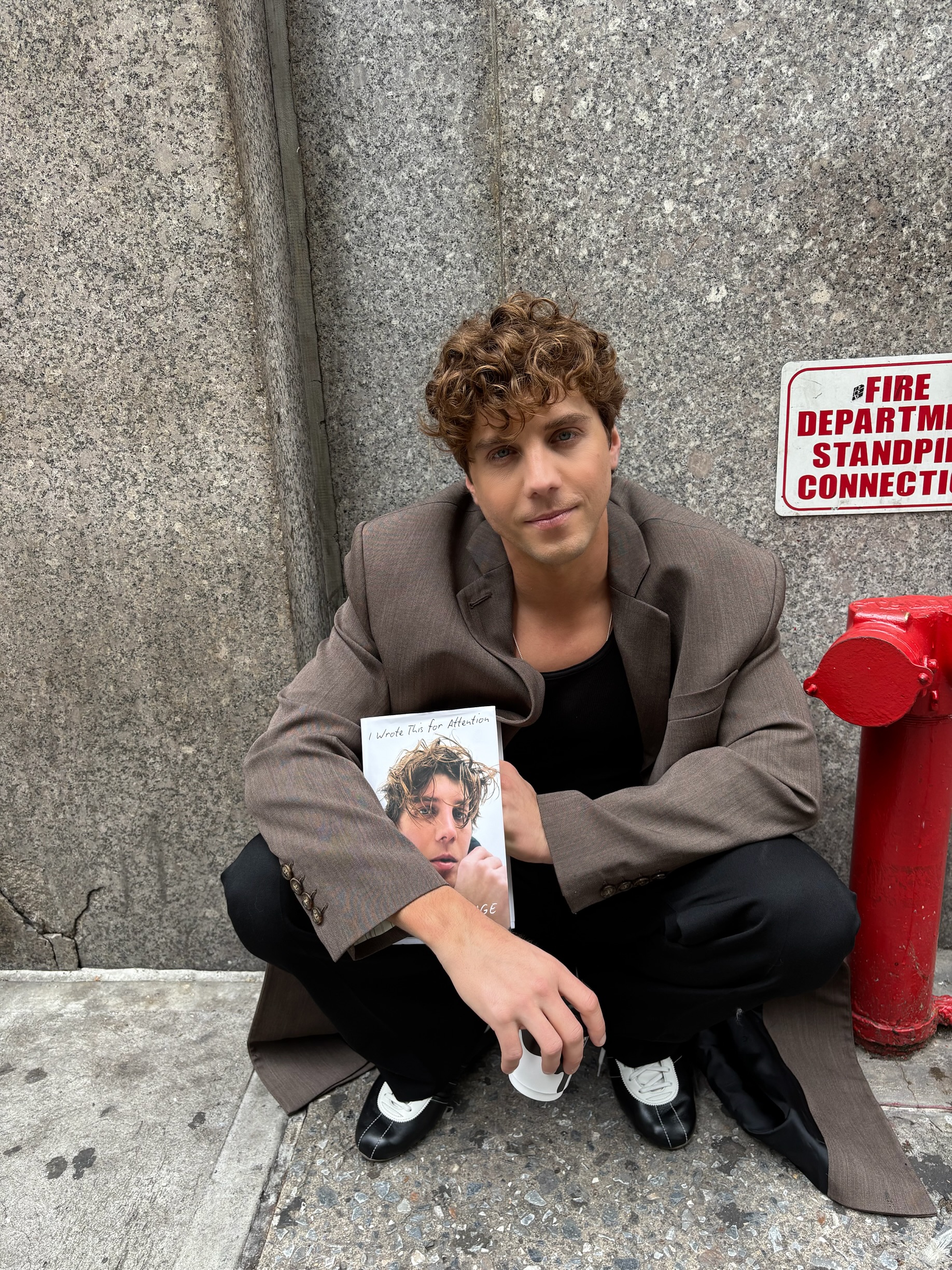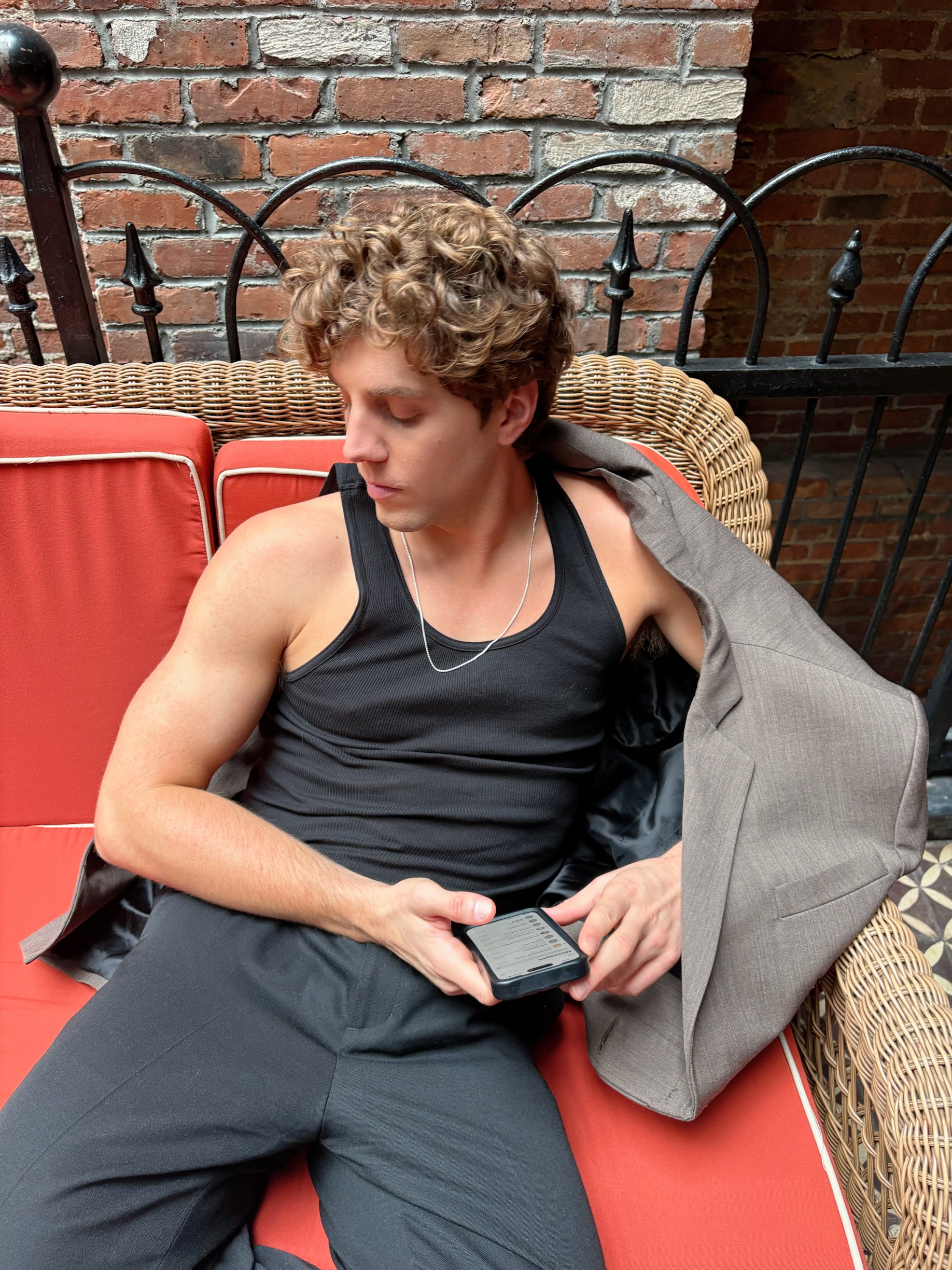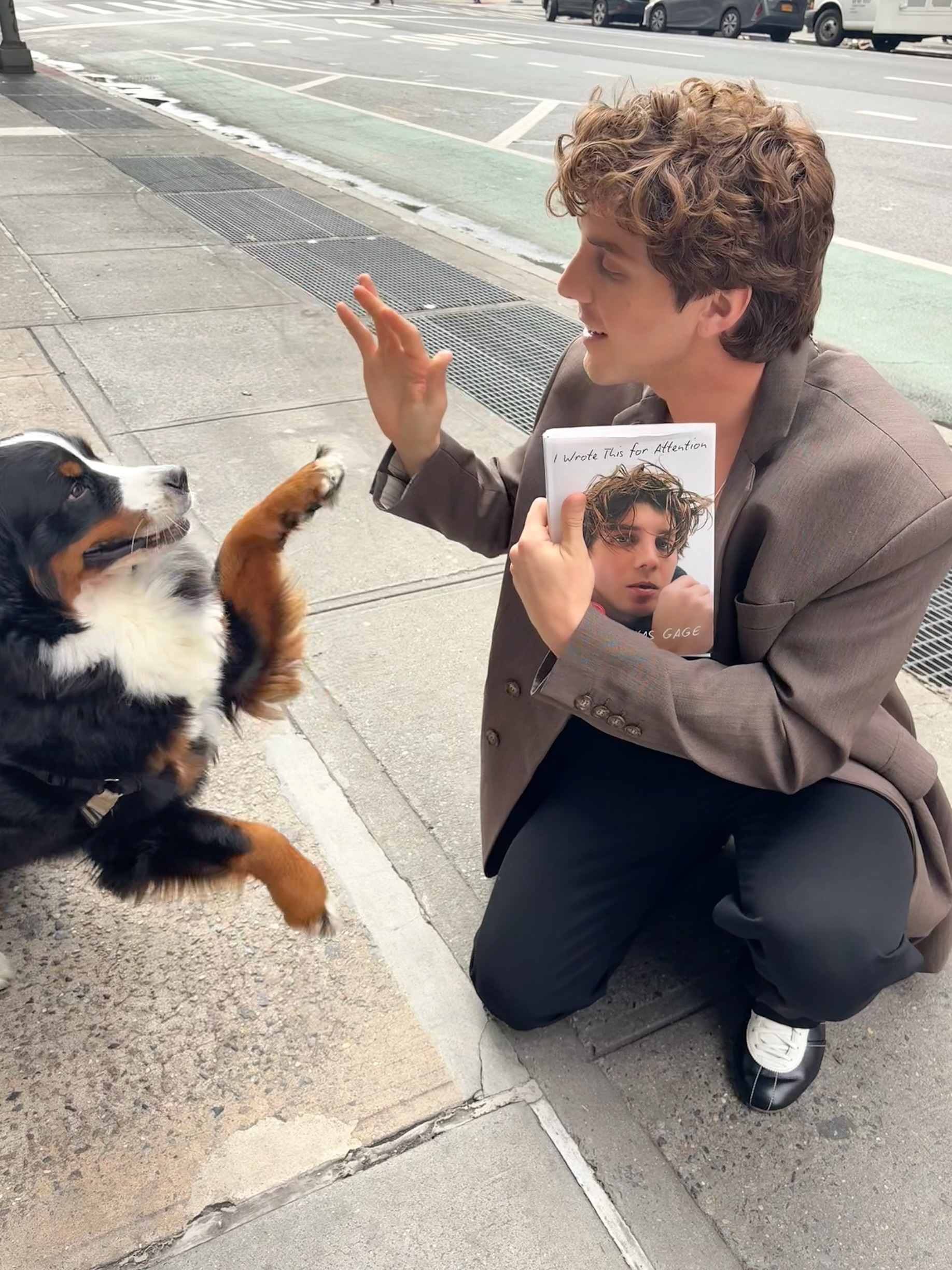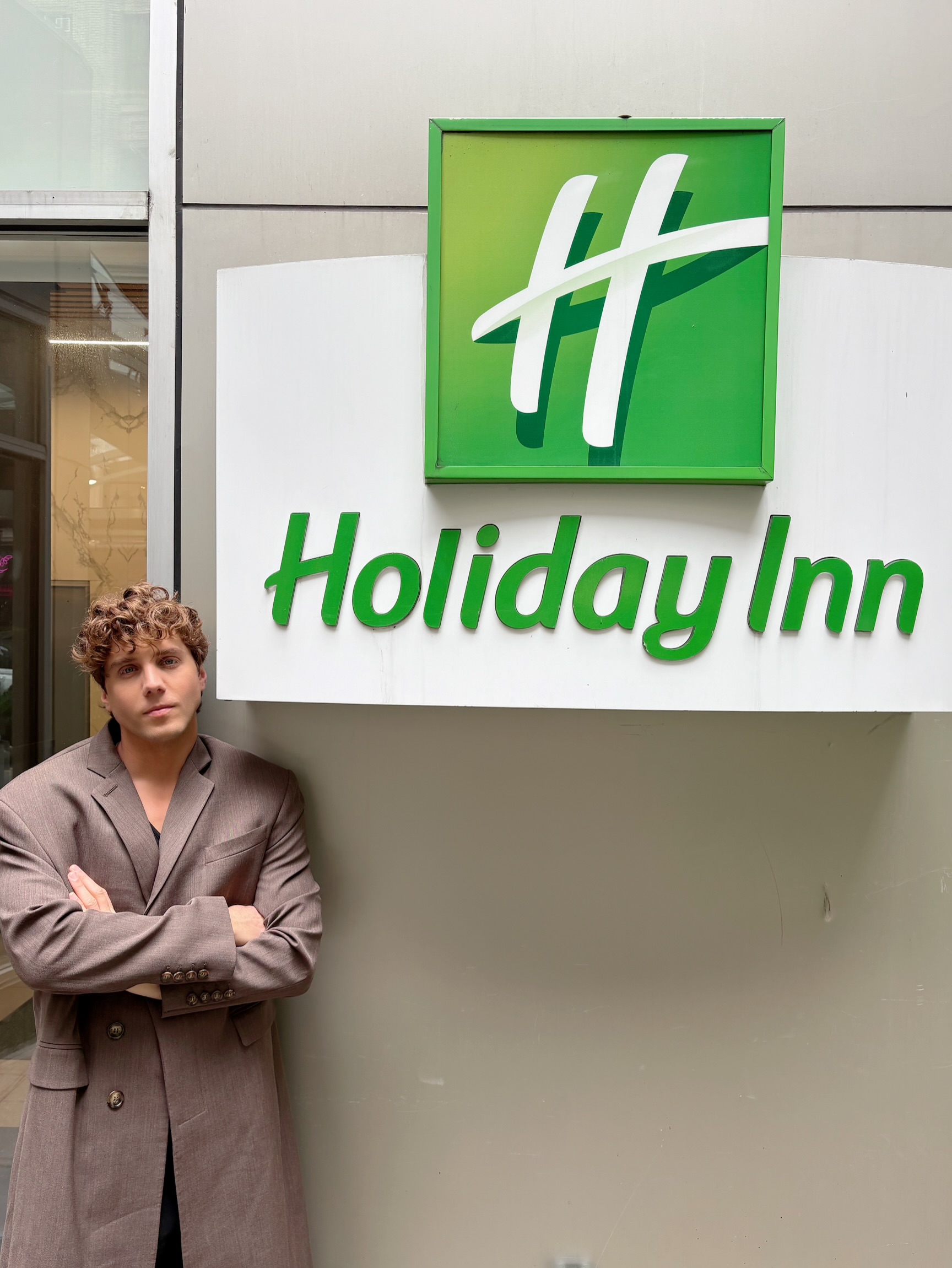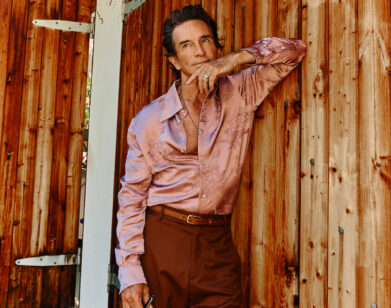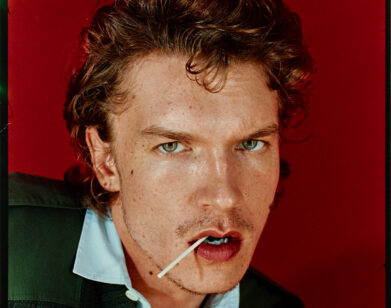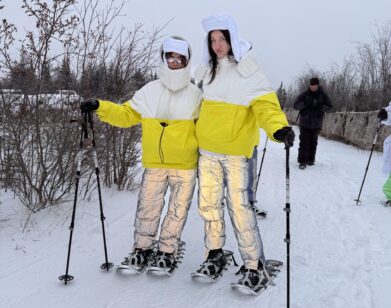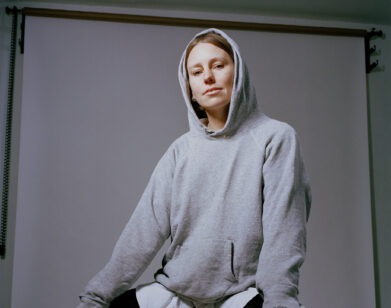MEMOIR
Lukas Gage: When Fame Meets Shame
When 30-year-old actor Lukas Gage pops up on Zoom to talk about his new memoir, no one would confuse him for a young aspirant trying to stay afloat Hollywood by auditioning on a video call from his apartment. And yet that notorious, viral 2020 Zoom audition, where the director, not realizing he wasn’t muted, critiqued Gage’s digs, served for many as the first introduction to the handsome, blond Californian who handled the awkward encounter with wit and smooth dignity. A lot has changed for Gage in five years—not least of which was his career-defining turn in the first season of White Lotus—but in many ways Gage is still the same person he was before he became a star. His new memoir, I Wrote This for Attention, charts his turbulent upbringing in San Diego, where he battles family demons, an addiction to The O.C., bad behavior (one scene involves candy flipping while hiding from his principal in a fast-food dumpster on prom night), and an endless craving for love and attention. (Luckily, his life raft of a mother and brothers proves the beating heart of the book).
The book also delves into Gage’s years starting out at as an actor in L.A., struggling to find his footing in an industry that doesn’t always reward character and individualism with paying roles. Gage is a terrific writer, a natural at capturing the greedy highs and lows of youth as he is at coming clean about the difficulties of coming out and his recent diagnosis of Borderline Personality Disorder. This is a searcher’s memoir, and its most cogent moments spring from the fact that the writer is still trying work out his place in the world. “If you google North County San Diego, you’ll find photo after photo of perfect California beaches stretching below steep, dramatic cliffs,” he writes. “Zoom in just a little closer and you’ll see a bunch of bored fourteen-year-olds losing their fucking minds.” Gage writes openly, freely, and tender-heartedly, so much so that even when he’s losing his mind the reader is right along with him, hoping he won’t get arrested.
———
CHRISTOPHER BOLLEN: Lukas, are you in New York?
LUKAS GAGE: Yeah. I met some of your colleagues at a party last week.
BOLLEN: Ben [Barna, Interview‘s executive editor] said that he had a great time with you.
GAGE: Did he send you our photo?
BOLLEN: No. Did you take one?
GAGE: Yeah. Ask for the photo.
BOLLEN: I will. Congratulations on the memoir. You are 30 years old which, at my age, still seems extremely young. Why did you feel like you could tackle a memoir at 30?
GAGE: I’ve read a lot of memoirs and personally, I found the ones where the person is still in progress, still just beginning in their careers, like Julia Fox and Jennette McCurdy, to be the ones I connect with the most. I like hearing about someone who doesn’t have it all figured out yet and is still a work in progress. I always thought I was going to write a book. I said in my journal as a kid, “I can’t wait to write a book.” Then when the strike happened, it seemed like a good time to have a full year to do nothing but write this thing.
BOLLEN: Often when I read a memoir, I skip over the childhood section and jump to the part when they’re 18 and starting their own life. But you’ve given us such a rich portrait of your family. I love that line about zooming in on the beach and seeing these lost, self-destructive teenagers. Which was more challenging: writing about your childhood or your years in Hollywood?
GAGE: I was met with some resistance about the adult years, to be honest. I think it goes back to your first question. I don’t feel like I have this huge life to reflect on and say, “Look at this amazing career.” I feel like I’m still figuring it out. I know people want to peek behind the curtain and read those kinds of Hollywood stories, but I found my childhood to be one of the most interesting parts about me. It felt so rich, and just having my journals as a kid, there was so much more to pull from.
BOLLEN: You’re a product of your age, in so many ways. We all are. But you talk about being influenced by touchstones like The O.C. Do you feel like you were a born actor and you found pop culture, or that the pop culture of that era seeped into you?
GAGE: I think the pop culture of that era really seeped into me. I was really informed by all these shows. The O.C., Rock of Love, The Flavor of Love, The Simple Life. They were such a reference point for everyone around me. I feel like TV shows maybe don’t hit as much right now as they did back then. Maybe there’s just more out there. But I remember dressing like Ryan Atwood from The O.C. and getting the leather jacket with the gray hoodie because I wanted to look like him. I remember wanting to be this playboy kind of guy in school because I loved Brett Michaels, and I thought it was so cool that he had 20 girls to make out with on a tour bus. [Laughs]
BOLLEN: It also feels like San Diego culture had a big influence on you. If you’d grown up in Vermont it would not be the same story. Especially being within arm’s reach of Los Angeles.
GAGE: 100 percent, yeah. San Diego is such a beautiful place, and my childhood was in many ways incredible and idyllic and felt like I was in a postcard all the time. But then there is this proximity to L.A. And then, on the other end, you’re next to Tijuana, and there’s access to drugs across the border. Sometimes I think, “I can’t believe as a teenager I could just drive to Tijuana at lunch, go to a bar, get tacos, and then drive back.” It was a wild place.
BOLLEN: Or buy Xanax, like you did with your girlfriend in high school.
GAGE: [Laughs] Yes, at a pharmacy. Exactly. Go to a strip club, get Xanax. But that was also informed by The O.C. I remember the episode where they went down to Tijuana on Spring Break, and that’s what we aspired to do as teenagers: have our trip to Tijuana and get blacked out.
BOLLEN: You wrote about identifying more with women characters in film and TV than with men when you were a kid I remember feeling that way too. I’m not sure if it’s related to being gay or it’s just that women have more dramatic roles. Is this still the case for you?
GAGE: I can only say that I gravitate towards those kinds of roles. I don’t see the Gena Rowlands type of roles out there for men. And I don’t see that you’re able to express that many layers of vulnerability or histrionic behavior that I see in female roles. But I do think that it’s starting to shift a bit. As a kid, that wasn’t as available to me in movies. You saw the leading man as tough and strong and not showing emotion, and you never see him vulnerable. Now there’s a little bit more variety. But there’s also something about being a little gay boy and loving female actresses.
BOLLEN: It’s so weird to remember myself in second grade pretending to be Sissy Spacek in Carrie and also thinking my parents must not have known I was gay. [Laughs]
GAGE: I think about this all the time. I’m singing in the bathtub to Britney Spears all day and only referencing female performances and dressing up like them, and nobody knew or was surprised when I finally told them. Even myself! Because I think whether it’s denial or just pushing that part of myself so far down, I didn’t have the words to be like, “Oh, I’m in the closet.” I look at other people and also my cousins, who are 18, and they came out of the womb open. And I’m like, “I wish I had that awareness that young.”
BOLLEN: It’s hard no matter the generation. But I do also think you might have been the last generation where there was such a stigma attached to the idea of it. That might be wishful thinking.
GAGE: There’s also the aspect of San Diego: it’s a military town with a military base, so it was a very macho upbringing. Being surrounded by that, there was an added element to be a tough, macho male.
BOLLEN: You’re very honest about your family in the book. You don’t shy away from their problems, even as it feels like a celebration of this family. How difficult was it to write about your brothers or your mom?
GAGE: First of all, thank you. I do love them so much and I’m so proud of all of them. It’s a tricky thing. It’s not their story to tell, and they don’t get a say in their perspective of it, so it’s hard to be fair to them. And there was a process of making sure that they were okay with me sharing, especially my brother. He wanted to be helpful in any way he could and said, “If you’re going to do this, and you’re going to talk about my issues, we need to shed light on stuff. We don’t want to punish people for needing help and these systems that fail vulnerable people.” So that was a part that I wanted to shed light on, some of these rehab places and these wilderness camps. I don’t think my story is necessarily an inspirational how-to guide. It truly is meant for the sake of being entertaining and for people to see themselves in there wherever they can.
BOLLEN: Toward the end of the book, you talk about being diagnosed with Borderline Personality Disorder. That’s not something you’ll find discussed so openly in a memoir.
GAGE: There was a lot of shame I had with it for so long. First it was being in the closet, and then it was being in the closet with a mental personality disorder—there was another thing I felt I had to hide and keep secret. There can be some fun to having a secret until it’s not fun, until it starts to eat you away and you feel shameful about it. I wanted to talk about it to ease the stigma around it. There’s so much false information out there. People think if you have a personality disorder, you’re a liability and you’re just going to be this nightmare person. But I just wanted to show people coming to terms with that diagnosis and the trial and error of figuring it out.
BOLLEN: This is the memoir of an actor, a celebrity. And you do write about your marriage, about White Lotus and Euphoria. But you seemed to try not to reap the sales benefits of telling salacious behind the scenes stories. That must be a tightrope walk. How much do you tell without it becoming gossip fodder.
GAGE: I can acknowledge that some of those sensational, click-baity stories get people enticed to read the book. And if you looked at my life on paper and saw the trajectory of my events, it’s pretty insane that this kind of fuck-up from San Diego is getting married on The Kardashians. And that is important to the story. I write about the viral audition video and the wedding stuff. But I’ve overshared on talk shows and interviews already so I thought, “I’ve already talked about that. I want people to know about all the stuff I haven’t said yet.” My favorite compliment or critique I got from the book is that the Hollywood stuff is less interesting than my childhood.
BOLLEN: I liked the character of your acting coach, and all the beautiful advice she gave you.
GAGE: Leigh Kilton-Smith changed my life, and to this day, I don’t believe I would be where I’m at if it wasn’t for her. And her teaching me that the thing that’s uniquely and authentically me is the thing that’s going to get me jobs, not me trying to fit myself into this mold. I went to L.A. trying to hide and be a version of myself that wasn’t true, and I didn’t get work. She really forced me to lean into what I am and lean into what I’m selling because that’s the only thing that is going to make me stand apart.
BOLLEN: There’s a lot of talk about more options for gay actors in Hollywood than ever before. Do you find Hollywood to be a welcoming place? Or is it still hard to find good roles and not be typecast and dismissed? I’m wondering if it really is a lot better or if there’s still a fence right in front of gay actors topped with barbed wire?
GAGE: I think both things are true at once. Yes, there are more options now than ever, but Hollywood still doesn’t always think outside the box. There’s definitely progress and more queer actors in roles that aren’t just stereotypes. But at the same time, there’s still a tendency to reduce us to shorthand. It’s better than it was, but it’s not exactly an open field either. I don’t personally feel dismissed. I feel more underestimated. It surprises me because its 2025. Like, who gives a shit?
BOLLEN: I think that when you write something about your own life, it changes you or your relationship to who you were. Do you feel like you’re completed some sort of chapter of life with this book?
GAGE: I don’t know if I’ve closed a chapter, because every day I am changing, I’m a different person truly every day, growing every day, and I’m surprising myself with the new information I find about myself. The biggest thing I got from digging into my past is walking away with an empathy and an appreciation for that messy, crazy California suburban tween that was going to raves every night and being a nightmare. Like, I’m so grateful for that kid, I love that kid. And I think before, I was a little bit hard on that kid.
BOLLEN: Thanks, Lukas, for the great read.
GAGE: Thank you, Chris. I appreciate it. Let me know when you see the photo. I think you’re going to like it.

